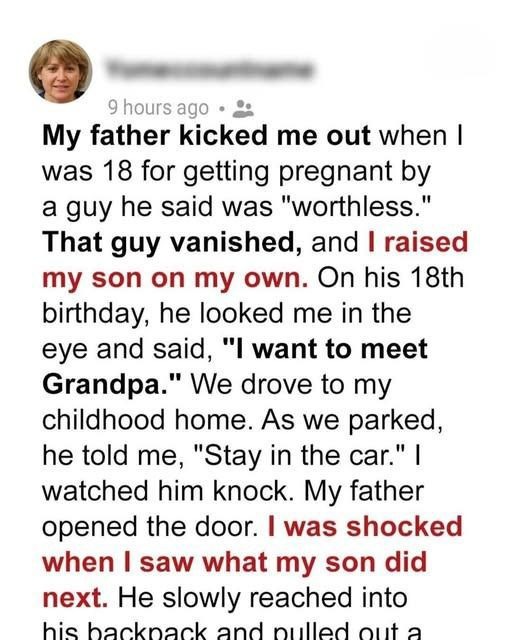I spent the first night at my best friend Jenna’s house. Her parents were polite, but uncomfortable, whispering about not wanting to “get pulled into something complicated.” By the third night, it was clear I couldn’t stay. Jenna cried when she pressed forty dollars into my hand. I told her I would figure things out, even though I had no real plan.
The youth shelter downtown gave me a bed in a room with three other girls. The place smelled like disinfectant and exhaustion. I lay awake most nights listening to the city noise and wondering how my life had spun so violently off track.
The baby’s father—Tyler—disappeared the day I told him. He blocked my number and moved on like I’d never existed. When I saw him at school one last time, he wouldn’t even look at me. By then, my belly had begun to show, and every stare and whisper from classmates felt like a shove. When the school counselor said I’d need a parent’s signature for any alternative program, that was the final blow. I dropped out because I had no parent left willing to sign anything for me, not even a form for help.
Survival became my full-time job. I cleaned offices at night, stocked shelves in a pharmacy, washed dishes in a diner. When the shelter time ran out, I found a room in a boarding house—basement level, damp, cold, the kind of place no one chooses unless there’s no other choice. The landlady, Mrs. Chen, told me, “Pay on time, you stay. Don’t pay, you go.” Simple and harsh, but straightforward.
I worked until the day I went into labor. My water broke while I was stocking shampoo, and my supervisor—one of the few people who treated me like a human—drove me to the hospital. After hours of pain and fear, I held my son for the first time. I named him Liam. Looking at him, tiny and perfect, I promised he would never feel unwanted the way I had.
The hospital social worker tried to convince me to give him up for adoption. She talked about “opportunities” and “stability” and “practicality.” I looked at Liam’s sleeping face and said no. No hesitation. No regret.
We left the hospital with nothing but a donated car seat and the fierce determination that I would somehow keep him safe.
Our first “home” was a room barely big enough for a twin bed and a crib. We shared a bathroom down the hall with strangers. I brought Liam with me to cleaning jobs, strapped to my chest while I swept floors. I learned to stretch every dollar—discount produce, hand-me-down clothes, coupons sorted at the kitchen table.
It wasn’t glamorous. It wasn’t easy. But it was ours.
Liam grew up watching me fight for every inch of stability. He never complained. By the time he was old enough to understand money, he already knew not to ask for things we couldn’t afford. Instead, he’d point out sales or help me calculate prices per ounce in the grocery aisle. When he was five, I finally saved enough for us to move into a place with a real bedroom for him. He ran around that tiny apartment like it was a mansion.
As he grew, Liam showed a natural talent for fixing things. When our beat-up old car died, he spent a weekend teaching himself from YouTube videos, scavenging a used alternator from a junkyard, and installing it himself. He was fifteen. That moment changed everything. He started helping at a local mechanic shop, and the owner eventually mentored him like the father figure he’d never had.
When Liam turned eighteen, I expected he’d want a celebration or a party. Instead, he told me he wanted one thing: to meet his grandfather. The man who’d thrown me out. The man who’d never met him.
I didn’t want to go back. The thought of standing on that porch again made my stomach twist. But Liam said he needed closure—not for his grandfather’s sake, but for his own. And he wanted me there.
The house looked smaller, neglected, almost sad. My father answered the door, and for the first time, he looked old. When he saw me, shock cracked through his expression. When he saw Liam, something else appeared—recognition, maybe even shame.
“This is Liam,” I said.
“Your grandson,” Liam added gently.
My father’s eyes filled with tears. Liam handed him a small box with a piece of his birthday cake inside. Then he spoke with a calmness that stunned me.
“I didn’t come to fight,” he said. “I came to tell you that I forgive you. Not because what you did was okay—because carrying anger would only weigh me down. I wanted you to see the life we built without you.”
My father broke down. He apologized through tears, but I wasn’t ready to accept or reject anything. I just said the truth: “We didn’t come for you. We came for him.”
We left soon after, but something had shifted. Not absolution. Not healing. Just the first crack in an old wall.
Over the next months, Liam saw him a few times. Eventually, I agreed to coffee. My father confessed regret, explained my mother’s death, told me she’d tried to find me but failed. None of it erased anything, but it softened the edges.
Liam built his own garage. I built a stable career. Our home became warm, safe, and ours in every way that mattered. My father comes around sometimes, quietly, respectfully, understanding that any connection now exists because Liam offered grace—not because he earned it.
The truth is simple: rejection didn’t destroy us. It forged us.
The night my father closed the door on me, I gained something stronger than anything he could have provided—a life built on resilience, love, and a bond with my son that nothing could break.
That closed door didn’t end my story. It started the one that mattered.

